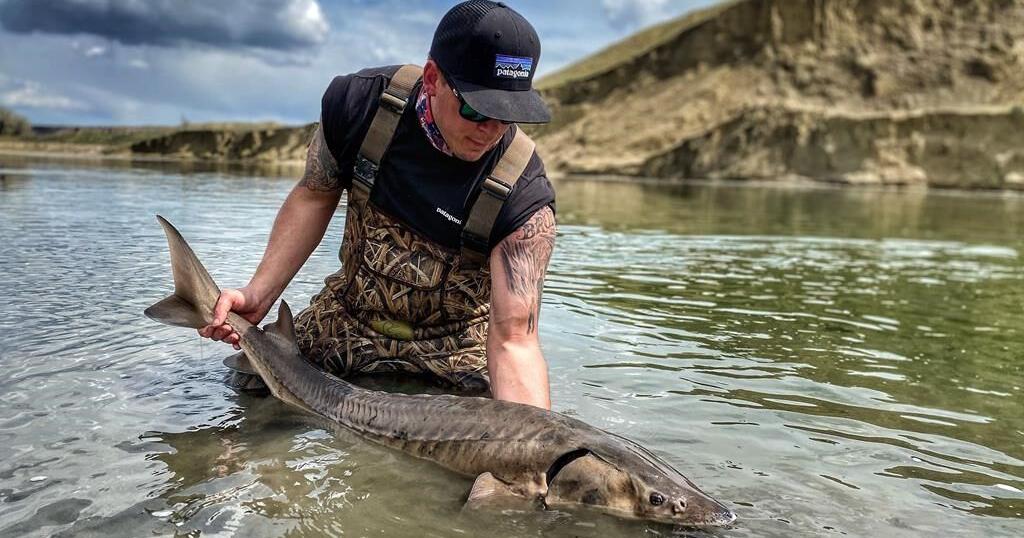EDMONTON – They lurk in the murky depths of some of Alberta’s biggest rivers, living fossils from when giant lizards strode the earth.
But a prominent fisheries biologist fears the province’s lake sturgeon may finally share the fate of the dinosaurs because of growing pressure on water resources.
“The more you shrink the area in which a critter lives, the greater the chances are that critter could wink out,” said Lorne Fitch, a retired provincial biologist, university professor and author. “That’s certainly what could happen to lake sturgeon.”
Lake sturgeon are unlike any other freshwater fish.
They appeared about 200 million years ago, somehow surviving the massive extinction of the dinosaurs and the freezing cold of the ice ages. They’ve changed little since — and look their age.
“They’re monsters,” Fitch said.
Covered with sharp, bony plates and coarse skin instead of scales, they can grow up to two metres long. Long, sensitive “whiskers” called barbels grow from the sides of their mouths, allowing them to find crayfish, snails, clams and leeches in the muddy river bottoms they frequent.
They have no backbones, having originated before fish evolved spines. They live for decades and are hard to spot.
But when they do appear, they look really intimidating, said Fitch.
“It’s like dragging the distant past out of a pool. It made me wonder, ‘What sort of a world did these fish evolve into that they had to have these armour plates?'”
Once abundant, sturgeon numbers have shrunk as water quality in Alberta rivers has deteriorated and their once uninterrupted courses have been chopped up by dams. Fitch said there are no reliable population estimates, but western lake sturgeon are designated as endangered under the federal Species At Risk Act and as threatened under Alberta legislation.
“We don’t really know how many sturgeon there are,” Fitch said. “We don’t know what the impact of invasive species is. We don’t know what the impact of drought is.”
Both current and possible future policies present problems, he added.
Clearcut logging reduces the ability of watersheds to regulate stream flows. Irrigation demands continue to increase, while regulators contemplate thirsty new industries, such as coal mining.
Meanwhile, Alberta’s population is growing rapidly. That brings demands for more drinking water and better flood protection as climate change makes extreme weather events more common.
New dams, which would further isolate sturgeon populations, are back in the conversation. The province is considering projects on the Red Deer and Bow rivers, as well as a weir on the South Saskatchewan.
“We’re not done thinking about dams,” Fitch said. “If those dams are built, they would further truncate lake sturgeon populations into smaller and smaller units.”
A 2002 feasibility study for the Meridian Dam, a now-abandoned project once proposed for the west side of the Saskatchewan-Alberta boundary on the South Saskatchewan River, acknowledged that dams and reservoirs could affect sturgeon. The study found such structures could block fish movement, reduce available food and limit spawning sites.
“The consequences of blocking fish movements in this section of the South Saskatchewan River are significant, because species such as lake sturgeon, walleye and sauger may be isolated from one or more critical habitats,” it says.
Ryan Fournier of Alberta Environment and Protected Areas said the province is working to improve water storage and management, especially in southern Alberta.
In an email, he said about $10 million in feasibility studies are underway for the proposed Eyremore Dam on the lower Bow River near Bassano and the Ardley Dam east of Red Deer on the Red Deer River. Both dams are in sturgeon habitat.
“A provincewide review is also underway to determine other areas where new water storage projects would be most beneficial,” he said. “We are taking a whole-government approach to maintaining provincial water management infrastructure systems to make sure Albertans have a safe, reliable water supply.”
Agriculture and Irrigation Minister RJ Sigurdson has said environmental concerns would be addressed in the studies.
Alberta would do better to try and curtail water demand instead of counting on greater supply — especially as climate change threatens to make the Prairies drier and hotter, Fitch said.
“If we continue to exacerbate the demand side, we will continue to (try to) outrun climate change with reservoir construction. And we’re going to lose.”
Sturgeon, which have already survived so much, will carry on if given a chance, said Fitch.
“This is a critter that outstrips human history, that outstrips the history of a lot of living things. The fact we still have them swimming in our rivers is a testament to their ability to endure.”
This report by The Canadian Press was first published Aug. 5, 2024.
